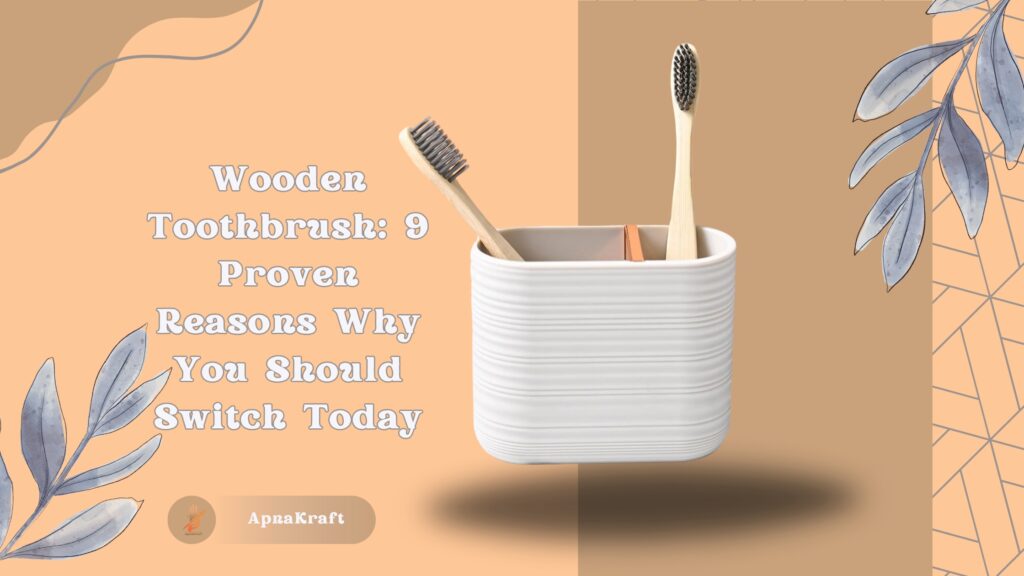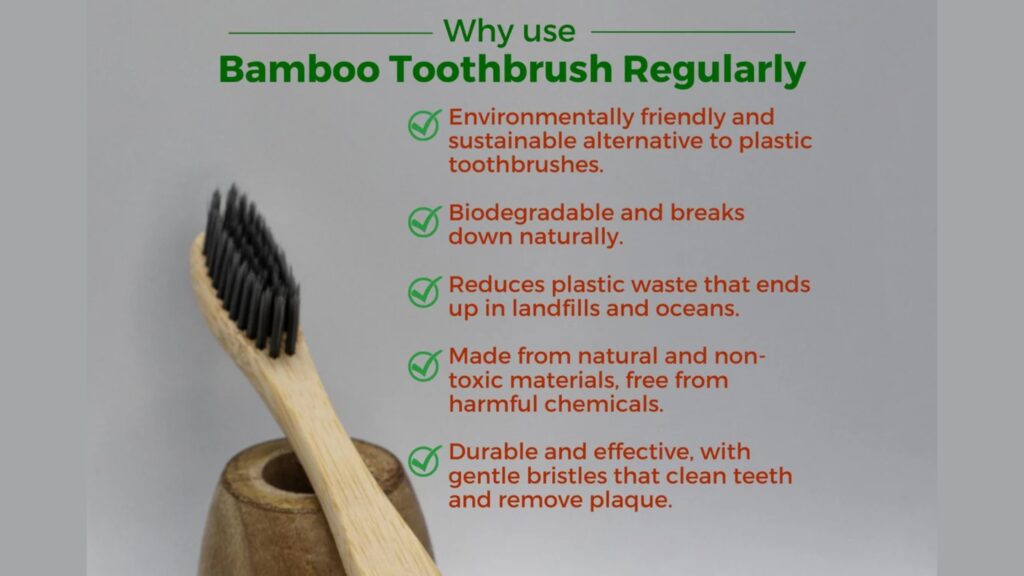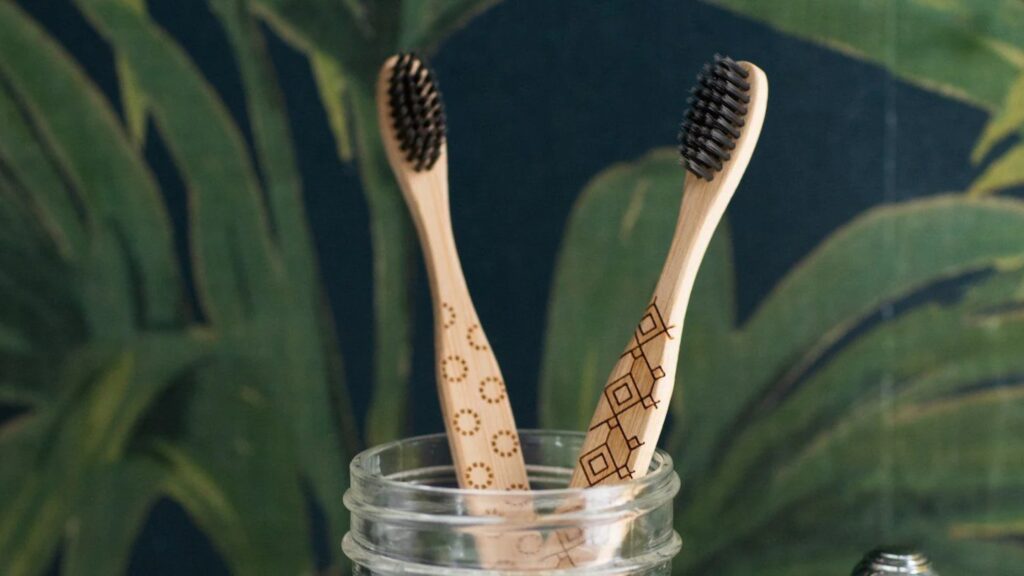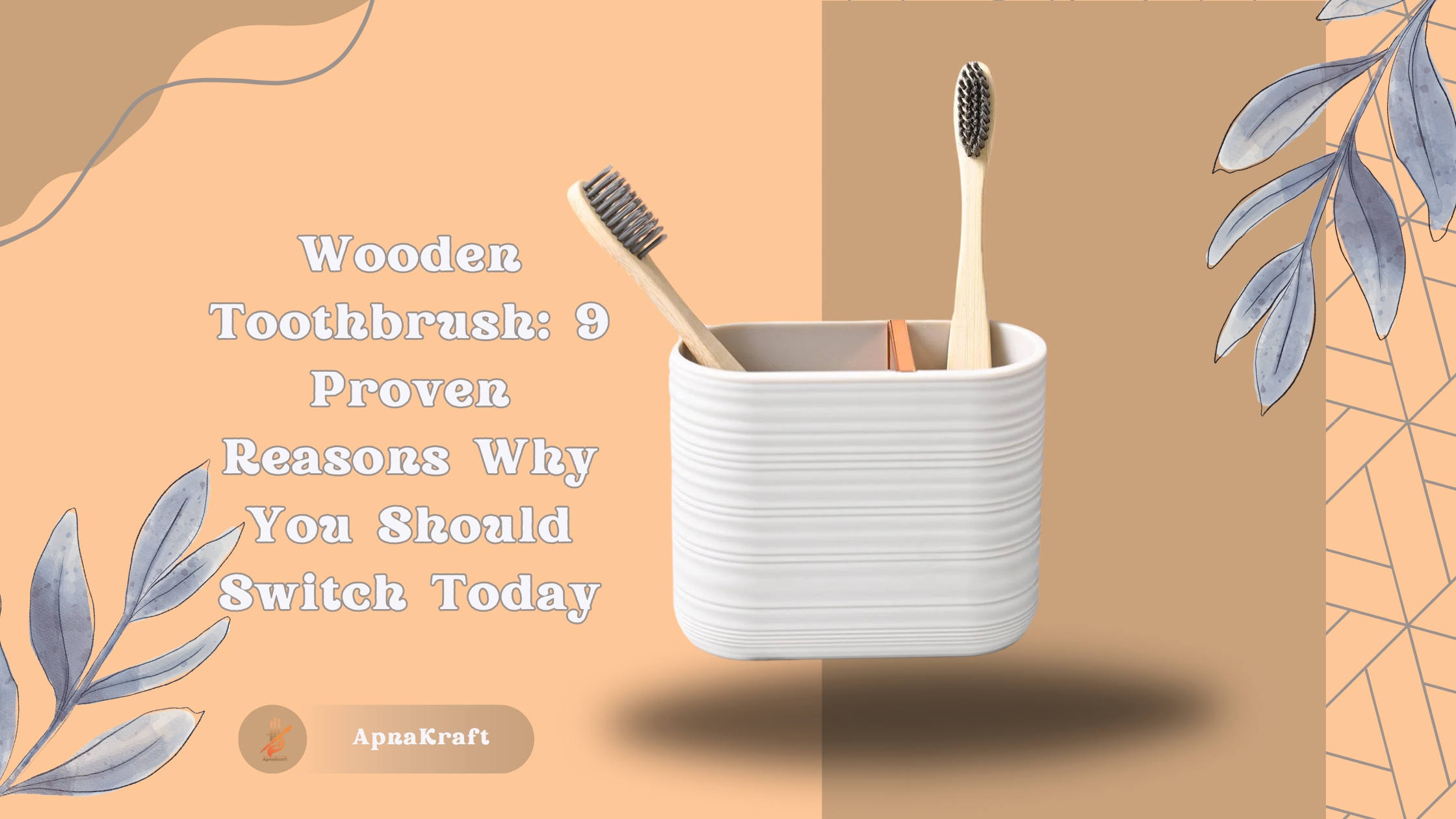Did you know over 1 billion plastic toothbrushes are discarded each year—enough to circle the Earth four times?
If you’re someone who cares about the planet and your oral health, it’s time to rethink your daily routine. One small but powerful change? Switching to a wooden toothbrush.

In this post, you’ll discover the 9 proven reasons why a Eco-friendly Toothbrush is a smart, eco-conscious, and effective upgrade. You’ll gain clarity on how it works, why it’s healthier, and which one suits you best. Backed by experience and real results, this guide will show you how a simple swap can make a big difference.
What Is a Wooden Toothbrush?
A wooden toothbrush is a sustainable alternative to plastic toothbrushes. Its handle is made from biodegradable materials like bamboo or neem wood, and its bristles are often plant-based or BPA-free nylon.
Key Features:
- Eco-friendly handles (biodegradable, compostable)
- Soft to medium bristles (gentle on gums)
- Non-toxic & BPA-free materials
- Naturally antimicrobial properties (especially bamboo & neem)
Why Wooden Toothbrushes Matter in 2025
Plastic waste has reached critical levels. As climate change awareness rises, so does consumer responsibility. A Bamboo toothbrush is one of the easiest ways to reduce your environmental impact without sacrificing performance.
Here’s what the shift means:
| Aspect | Plastic Toothbrush | Wooden Toothbrush |
|---|---|---|
| Material | Petroleum-based plastic | Bamboo, neem, or beechwood |
| Lifespan | 3 months | 3 months (same) |
| Environmental Impact | Non-biodegradable, polluting | Biodegradable, compostable |
| Health Concerns | Often contains BPA | Non-toxic, natural options |
| Style & Feel | Mass-produced, generic | Earthy, aesthetic, handcrafted feel |

9 Proven Reasons to Use a Wooden Toothbrush
1. Eco-Friendly and Biodegradable
Natural Toothbrushes, especially those made of bamboo or neem, naturally decompose, helping reduce landfill waste.
2. Naturally Antimicrobial Properties
Certain woods like bamboo and neem resist bacteria growth, making them a cleaner option for your bathroom.
3. Free from Harmful Chemicals
Many plastic brushes contain BPA, phthalates, and other toxins. Wooden alternatives use natural, safe materials.
4. Gentle on Gums and Teeth
The bristles are often softer and more flexible, reducing gum damage and enamel wear.
5. Supports Sustainable Living
Choosing wood supports sustainable forestry and biodegradable packaging, aligning with green lifestyles.
6. Aesthetic and Minimalist Appeal
Wooden toothbrushes add a rustic, clean design to your vanity. They’re visually pleasing and practical.
7. Durable and Ergonomic
Despite being biodegradable, wooden handles are sturdy and comfortable to grip, lasting as long as plastic ones.
8. Compostable After Use
Many wooden toothbrushes can be composted by removing the bristles and recycling separately.
9. Part of a Larger Eco-Movement
Using a Natural Toothbrush shows your support for zero-waste living, conscious consumption, and ethical production.

How to Use and Maintain a Wooden Toothbrush
Caring for your wooden toothbrush ensures longevity and hygiene:
- Rinse thoroughly after each use to prevent waterlogging
- Store upright in a dry holder—avoid sealed containers
- Replace every 2–3 months (just like plastic ones)
- Compost handle and remove bristles before disposal
Real-Life Experience: What Users Say
“I switched to a neem wooden toothbrush six months ago. Not only do my teeth feel cleaner, but I feel good knowing I’m not adding more plastic to the planet.”
— Aarav Mehta, Sustainability Blogger
“These bamboo brushes are stylish and eco-friendly! They make great gifts too.”
— Riya Kapoor, Conscious Living Advocate
“After switching to wooden-toothbrushes for my dental clinic, patients loved the change. It’s cost-effective and eco-smart.”
— Dr. Neha Sood, Dentist at GreenSmiles Dental Studio
FAQ: People Also Ask
What is a wooden toothbrush and why is it important?
It’s a toothbrush with a wooden handle made from bamboo or neem, used to reduce plastic waste and promote sustainable oral care.
How long does a wooden toothbrush last?
Typically 2–3 months, similar to plastic brushes. Proper care can extend its life slightly.
Are wooden toothbrushes hygienic?
Yes. Bamboo and neem have antibacterial properties, and with proper maintenance, they’re as hygienic as plastic brushes.
Can I compost a wooden toothbrush?
Yes—after removing the nylon bristles, the wooden handle can be composted.
Are wooden toothbrushes good for kids?
Absolutely. They’re safe, toxin-free, and come in kid-friendly designs with soft bristles.
Related Insights: People Also Search For
- Bamboo Toothbrush
- Eco-Friendly Oral Care
- Zero-Waste Bathroom Essentials
- Neem Toothbrush Benefits
- Sustainable Personal Hygiene
- Biodegradable Toothbrushes
Conclusion: One Small Change, Big Impact
Switching to a wooden toothbrush is one of the easiest, most impactful eco-friendly decisions you can make in 2025. It helps the planet, supports your health, and promotes sustainable habits.
Whether you care about zero-waste living or simply want a better, safer brush—this small change brings big rewards.
Ready to switch? Try it out and feel the difference.
Explore handcrafted, sustainable essentials at ApnaKraft’s All Bamboo Products Collection and start building a greener lifestyle—one conscious choice at a time.
Have questions or experiences to share? Drop them in the comments below!

